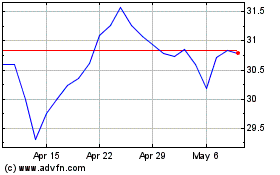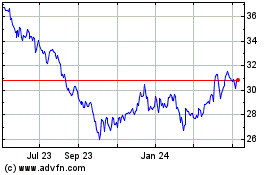Kraft Lobbying Charges Shrink - Analyst Blog
December 23 2011 - 12:16PM
Zacks
Kraft Foods Inc. (KFT) reported that it spent $640,000 during
the third quarter 2011 on issues related to transportation,
agriculture, trade and other matters. The lobbying charges shrunk
1.5% from $650,000 spent during the third quarter of 2010 and 12.3%
from $730,000 spent in the second quarter of 2011.
According to the filing with the House clerk's office, Kraft
lobbied Congress, the U.S. Department of Agriculture, the White
House, the Food and Drug Administration, and other agencies from
July through September.
As a major food producer in the United States, Kraft’s business
is affected by agriculture policy, trade policy, and other
government activity and regulations. Kraft spent a lot of money on
the issues such as marketing to children.
Kraft and other peer companies have adopted voluntary compliance
with advertising guidelines related to children, which are exposed
to a vast number of TV ads for food products such as sodas, cereal,
candy, and fast food. The companies believe that advertisements
strongly influence children’s preferences and food requests.
Therefore, they should now work towards marketing techniques so
as to advertise such products which are beneficial for children. In
addition, the companies will put in efforts to have all the
nutritional information and benefits of food properly labeled on
its packages.
On November 2, Kraft posted robust third-quarter 2011 earnings
of 58 cents per share, surpassing the Zacks Consensus Estimate of 56 cents per
share by 3.6% and by 23.4% from 47 cents in the prior-year quarter.
Management credited the benefits of increased investments in
marketing and innovation, effective advertising and focus on
End-to-End Cost Management for strong results in the quarter.
Operating gains, favorable foreign currency and discrete tax items
also contributed to the profit.
Following the strong results, Kraft revised its 2011 operating
earnings guidance to at least $2.27 from at least $2.25.
Kraft’s plan to spin off its North American grocery business to
its shareholders and split itself into two independent public
companies is on track. It will split into a high-growth global
snacks business with estimated revenue of approximately $32 billion
and a high-margin North American grocery business with estimated
revenue of approximately $16 billion.
Global snacks will consist of the current Kraft Foods Europe and
Developing Markets units as well as the North American snacks and
confectionery businesses. The North American grocery business would
consist of the current U.S. Beverages, Cheese, Convenient Meals and
Grocery segments and the non-snack categories in Canada and Food
Service.
Kraft is stated to drive confidence from the belief of
continuing strong business momentum in the challenging environment
of weak consumer and category growth as well as significant input
cost inflation.
We remain encouraged by the company’s investments in quality
upgrades, promotions and marketing as well as initiatives taken to
improve margin and productivity by reducing manufacturing and
overhead costs and enhancing operational efficiencies by
modernizing plants and information systems.
However, higher commodity costs, increased marketing expenses,
competition from private labels and presence of tough competitors
like Unilever Plc. (UL) and ConAgra Foods
Inc. (C concern us.
Currently, we prefer to rate the stock as Neutral. Further,
Kraft Foods holds the Zacks #3 Rank, which translates into a short-term Hold
rating.
CONAGRA FOODS (CAG): Free Stock Analysis Report
KRAFT FOODS INC (KFT): Free Stock Analysis Report
UNILEVER PLC (UL): Free Stock Analysis Report
To read this article on Zacks.com click here.
Zacks Investment Research
ConAgra Brands (NYSE:CAG)
Historical Stock Chart
From Jun 2024 to Jul 2024

ConAgra Brands (NYSE:CAG)
Historical Stock Chart
From Jul 2023 to Jul 2024
